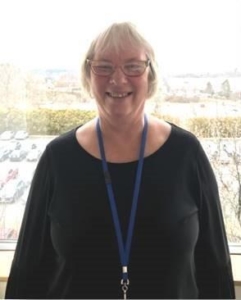What Happens Next? The Role of Supporting Decision-Making in the Lives of Sexual Assault Survivors With Disabilities

Patty Quatieri is an accomplished presenter in the field of disability rights and is based in Massachusetts. Patty has received numerous awards for her civil rights advocacy and established the first agency-wide newsletter: The Peer Support Press. She is one of the three founding leaders of the National Peer Support Network.
“People assume because we have a disability we don’t need to know what sex means and how to give consent. They only see the disability. Too many people believe we can’t have an intimate relationship or get married. I didn’t have sex education because my parents wanted to protect me. My mother took me out of the sex education class. After I was sexually assaulted, she was even more overprotective and limited my freedom. I still was not provided sex education.” – Patty Quatieri
As we recognize Sexual Assault Awareness month, the data tells a disturbing story: the National Crime Victim Survey reveals that people with intellectual disabilities experience sexual violence at seven times the rate of those without disabilities.
In our society today, it’s not easy to talk openly about sexual violence, even with increased dialogue around the issue through the #MeToo movement. This is true when it comes to talking with people in the health care profession about sexual violence as well. Health care providers rarely report sexual assault and do not engage victims with intellectual and developmental disabilities (IDD) in conversations about what happens next and how to get ongoing support. Additionally, there are limited communication tools available that encourage deeper conversations between patient victims and providers to achieve patient-centered outcomes.
To address these issues, we should be asking:
- How can we support people with IDD to make decisions about if, when, and how they want to talk about sexual victimization they have experienced?
- How can we ensure people with IDD are supported to make their own decisions about what happens next after victimization occurs (for example, where to get help—through peer to peer support, one-on-one counseling, or other options)?
- How can we support people with IDD, like Patty, to decide for themselves about when and how they want to participate in sex education?
The answers to these important questions will help us move the needle in preventing and responding to sexual violence of people with IDD. The Talk About Sexual Violence project is working to make conversations on this topic easier for both health care providers and people with IDD, who have valid concerns about what might happen to them if they choose to disclose sexual harassment, abuse, or assault to a health care provider.
Now in Phase III of the project, our focus is on how health care providers can support people with IDD to have choice and autonomy when making decisions about follow-up care. By applying the core principles of supported-decision making, survivors of sexual violence can make their own decisions and stay in charge of their own recovery, while receiving any guidance, help, or support they need to do so.
The challenge is clear: despite a well-known national epidemic of sexual violence against persons with IDD, health care providers continue to struggle with having the knowledge, training, and tools needed to adequately address it. There are still far too many victims with IDD living with sexual trauma who are not receiving any support after trauma occurs.
The numbers are too high to ignore. The disability community must work closely with the victim advocacy community to target key professionals who have direct access to sexual assault victims with disabilities. Educating health care providers about the value of having conversations about sexual violence with their patients is an important beginning step for victims to 1) comprehend what has happened to them and 2) learn ways to actively engage in making their own decisions about what happens after victimization occurs. This is how victims can reclaim their power and voice after victimization and begin their healing process. The Talk About Sexual Violence project will be creating tools, webinars, and reports on this topic over the next three years to address these issues.


 Steve has cerebal palsy. For most of his young life, and like many people with disabilities, he lived with his mom. When Steve was only 22 years old, his mom became very ill. Because she could no longer provide the supports he needed, Steve was forced to move into a nursing home to get the care he could no longer receive in his childhood home. Even though Steve knew he could make it in the community with the right supports, he was forced to make this move. This was because his family was concerned about his well-being if he lived independently, and because they feared the appropriate supports were not available to him.
Steve has cerebal palsy. For most of his young life, and like many people with disabilities, he lived with his mom. When Steve was only 22 years old, his mom became very ill. Because she could no longer provide the supports he needed, Steve was forced to move into a nursing home to get the care he could no longer receive in his childhood home. Even though Steve knew he could make it in the community with the right supports, he was forced to make this move. This was because his family was concerned about his well-being if he lived independently, and because they feared the appropriate supports were not available to him.





